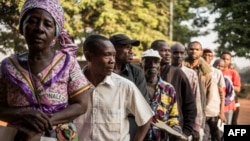National elections in the Central African Republic appeared to be in jeopardy Wednesday, as the country's election authority said time was short to organize the vote.
The elections, set for December 27, will mark the first time since the Seleka rebels ousted the government in 2013 that voters in the C.A.R. select a new president and parliament.
The National Election Authority, or ANE, reports that 1.7 million people are registered to vote.
But many have yet to receive their voter cards. Ballots arrived this week and still need to be distributed across the country, but there might not be enough time, says Mourouba Sakanga, ANE logistics officer.
"We have very little time to organize the elections and we had to rush," he said. "The time to realize the elections is not really there. Despite this, we are doing all we can to be ready in time."
The vote, whenever it takes place, will occur amid continued insecurity. The armed groups that ousted President Francois Bozize in March 2013 are still present in the capital, and in particular in the Muslim-majority neighborhood PK5.
Mahamat Saleh, a resident there, says he wants to vote.
"We have to vote for peace to return,” he said, “but these people attacking us, they don't want the peace to come back. They benefit from the chaos."
Logistical problems may be especially hard to surmount in areas outside the capital with a heavy militia presence, like the town of Carnot in the western part of the country and the town of Bossangoa, about 200 kilometers north of the capital.
"We, the army, have limited means to protect the population," said George Silla, the ANE head of security. "Outside of the capital we depend on the international forces, the French forces and the U.N. peacekeepers to make sure voters can cast their vote at polling stations."
Possibility of peace
While some have called for the elections to be postponed, France, which has a military presence in the C.A.R., and the U.N. peacekeeping mission, known as MINUSCA, are pushing for elections to take place as scheduled.
Elections are the only way to help the C.A.R. out of the country's three-year crisis, says Geuret Mayanga, a taxi driver.
"The elections might bring peace but what's really needed, however, is a change of the population's mindset," he said. "Real peace can only come through the heart."
Thirty-eight percent of registered voters cast ballots in last week's constitutional referendum, and those who hadn't received voter cards were allowed to use the card's receipt. However, it's not clear if that will be possible when the national elections take place.




